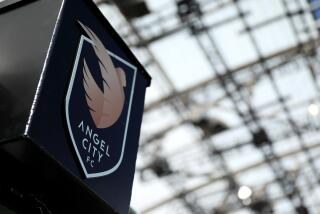Seattle officials sold city’s ‘soul’ to N.Y. investors.
- Share via
SEATTLE — Residents of this city have finally found a group that irritates them more than the recent wave of immigrants from Southern California.
New Yorkers.
More specifically, a New York-based real estate firm called the Urban Group. Seattle has been shocked this winter to learn that local officials, starting in 1981, quietly sold or leased to the company 11 buildings making up 90% of the city’s famed Pike Place Market.
If the Space Needle is the most visible symbol of Seattle, the market, in the words of produce seller Tim Manzo, “is the very heart and soul.”
And if new arrivals from California have added to Seattle’s congestion and driven up housing prices, the New Yorkers seem infinitely worse: outsiders, jetting in and circulating an investment prospectus proposing to as much as triple market rents in a dozen years.
“If that happens there won’t be any of us left in business,” said restaurateur Janet Shane, whose husband, Ron, has bought a T-shirt with a ghost buster-like slash mark over the letters N.Y. “All of this will be turned into some kind of boutique place,” she said, gesturing to her funky, functional shoe box cafe with its vinyl booths and worn wood floor.
The outrage by market tenants and city officials has taken the leaders of the 30 or so Urban Group investors by surprise, said Donald Stark, a Seattle public relations consultant serving as spokesman.
“I don’t think they knew they were buying the soul of Seattle,” Stark said, adding that all the group wants is a reasonable return on its property.
Occupying a dozen buildings in a 7-acre national historic district downtown, the market’s mix of farm produce, iced fresh fish, fragrant bakeries, craft stalls, antique shops, newsstands and cozy restaurants draws 10 million visitors a year. There are jugglers and street musicians, flower shops and import stores, low-income housing and a luxury hotel, all sandwiched between a brick street on one side and a Puget Sound view on the other.
The bustling clamor, pungent smells and earthy homeliness of the market’s labyrinth of passageways is the antithesis of swank new centers such as Westlake Mall a few blocks away. When McDonald’s asked to locate there, it was swiftly turned down.
Selling the market is tantamount to selling Fisherman’s Wharf, Disneyland or the Statue of Liberty, Ron Shane said.
And to New Yorkers no less, the folks the rest of America loves to hate. One merchant told a local columnist he’d prefer owners from another country, such as Japan, to those from another planet, such as New York.
“I think if the New Yorkers get their way, (the) market is going to be torn down and replaced with some high-rise condo with a replica of the market underneath,” said orchardist Bob Spanjer.
“No way will the market be changed,” vowed Mike Carroll, director of the city’s Preservation and Development Agency, which runs the market. “The people of this city will not allow that to happen.”
But it was the agency that got the market into the current fix. Short of money in 1981 to complete planned renovation, the agency approached the Urban Group with a proposal to sell the market buildings for $23 million, $3 million of it in cash and the rest due in balloon payments in the 1990s.
The Urban Group specializes in investments in historic buildings, including one in Seattle’s Pioneer Square and another in neighboring Tacoma, Wash.
The market got the $3 million needed to complete its work. The Urban Group got a tax write-off that President Arthur Malman said has resulted in $10 million in tax credits, accelerated depreciation and write-offs.
Market officials now say they expected the New Yorkers to walk away from the deal once the balloon payment came due, since market rents couldn’t cover the cost of the mortgage.
Then came the Tax Reform Act of 1986, which eliminated the group’s tax break. But with Seattle real estate values soaring, the group decided the buildings might be worth hanging onto, and it has proposed making its balloon payment by refinancing its mortgage. It has circulated a prospectus to outside investors that proposes raising rents and slashing expenses.
In a letter to market merchants, Malman and Martin Major, the Urban Group’s vice president, have complained they have received only $4,000 in rent since the deal was struck. “Every time rent income went up, the PDA’s (Preservation and Development Agency) overhead charges also went up as much or more,” they said.
Carroll replied that the market, run by an agency answerable to the public, is not supposed to produce income. The market also finances social service agencies for street people and day care.
“The solution is getting the Urban Group to realize there is no profit here,” Carroll said.
In coming months both sides are expected to give battle with dueling audits, budgets and histories drawn out of 1,000 pages of documents that comprise the deal. A Seattle deputy mayor with a reputation as a tough negotiator, Shelly Yapp, has been hired by Carroll’s side. Ultimately the dispute could wind up in court.
Meanwhile, those at the market wish their new-found landlords would just go away.
“I think they should accept the fact they made a bad investment, go home and quit whining,” said Mariane Scott at Lil John’s Produce.
“Give em’ back their damned $3 million,” said Leon Franko, a fishmonger stacking squid, “and tell them where to go.”
More to Read
Inside the business of entertainment
The Wide Shot brings you news, analysis and insights on everything from streaming wars to production — and what it all means for the future.
You may occasionally receive promotional content from the Los Angeles Times.










